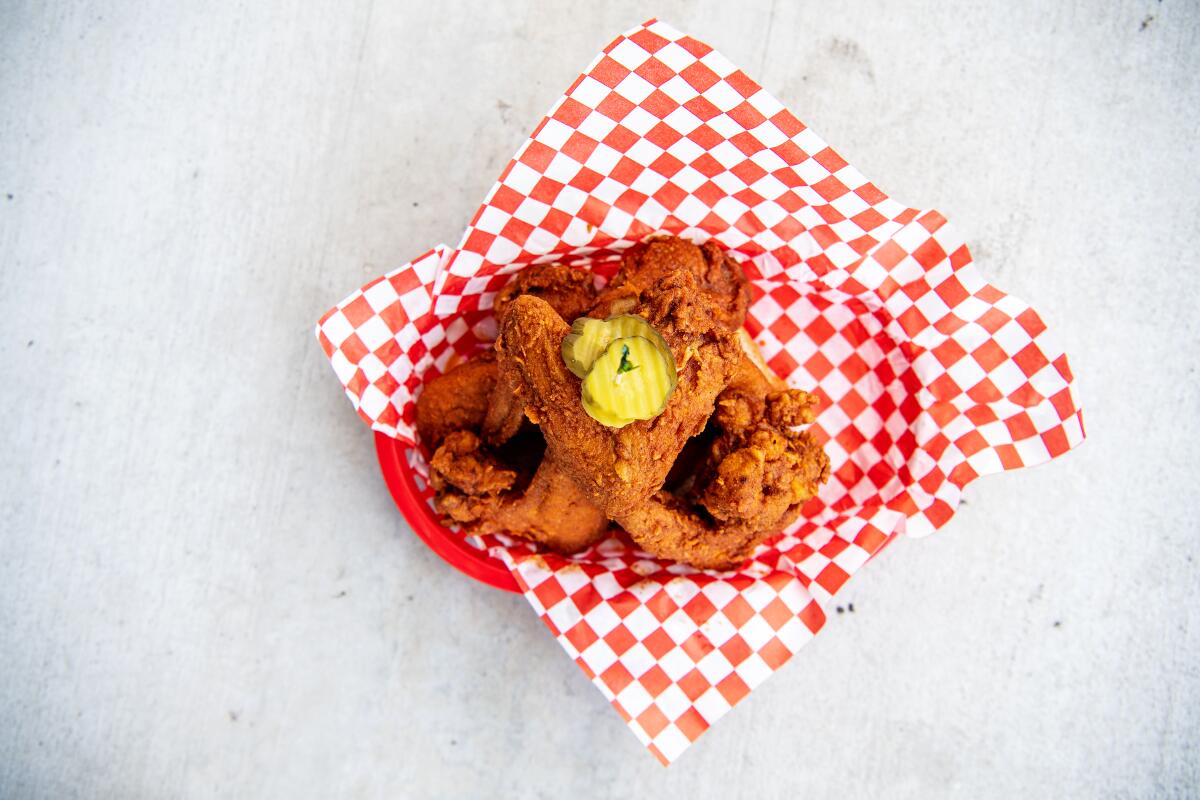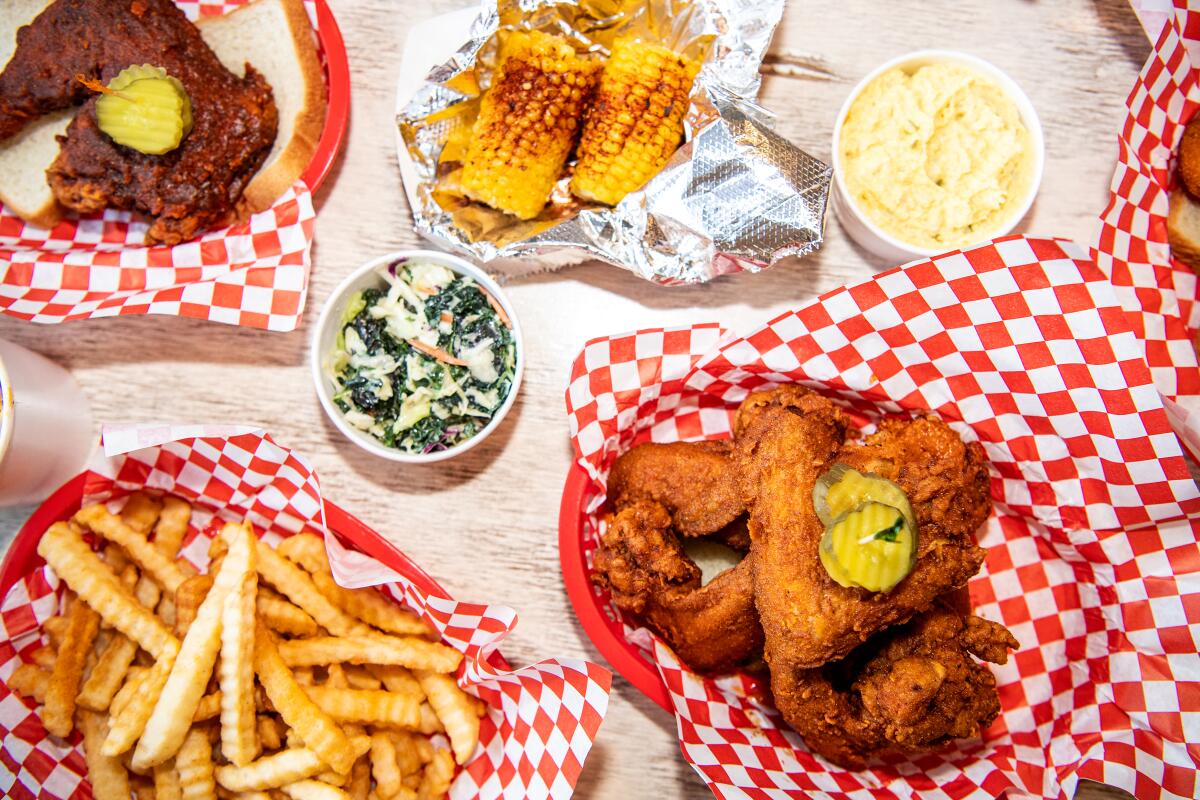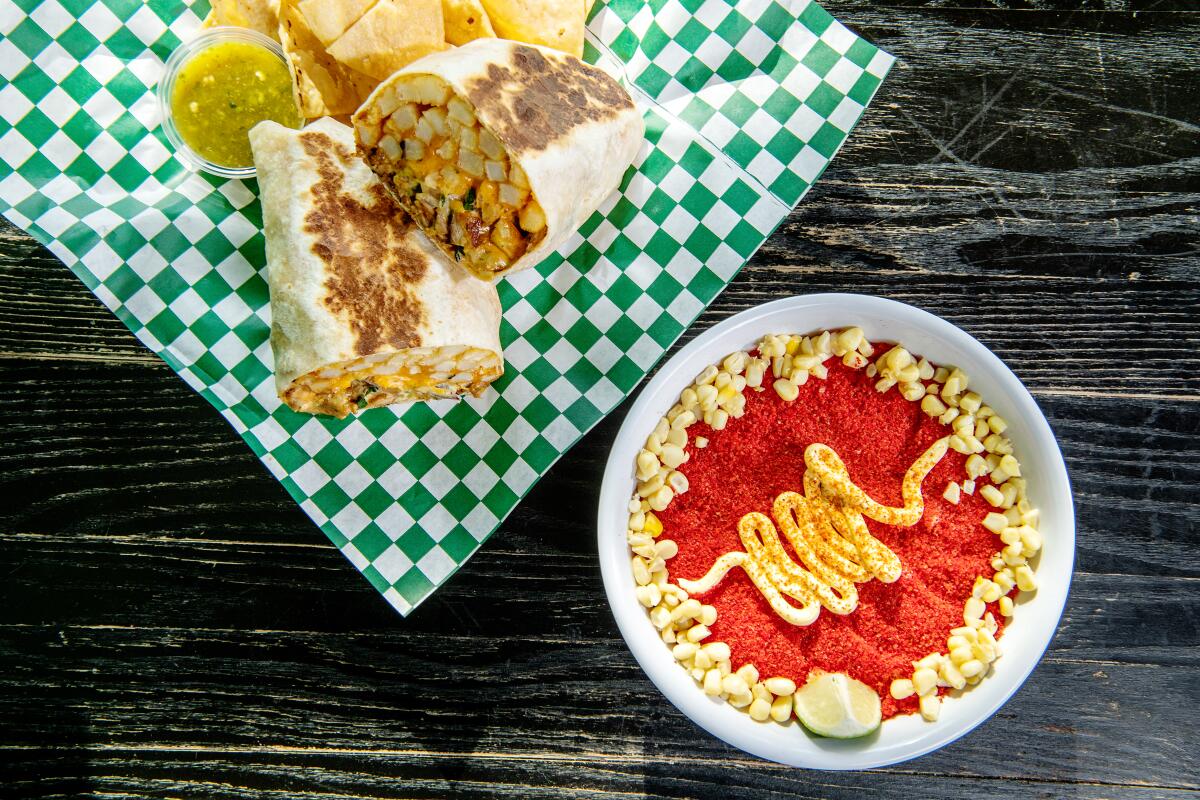The heat is on, L.A. The family that invented Nashville hot chicken has arrived

- Share via
At my first meal at Prince’s Hot Chicken in Nashville, I remember chomping into a drumstick and thinking for an instant, “Oh, this heat isn’t so crazy.” The restaurant ignited fried chicken with four levels of spice: mild, medium, hot or extra-hot. This bird was at level three: hot. The seasoning blend is famously a secret, but there was so much chile powder in the ruddy paste that the first bite felt sandy on the palate. The texture was oddly enjoyable.
Eat your way across L.A.
Get our weekly Tasting Notes newsletter for reviews, news and more.
You may occasionally receive promotional content from the Los Angeles Times.
Then the involuntary reactions kicked in.
My nose ran. My scalp tingled. Endorphins rushed to quell the pain, which made my entire body buzz. I was laughing through the distress. I reached, illogically, for a few crinkle fries to cool the burn. They did nothing. I ate more chicken.
The lore has always been as fun as the zing: Andre Prince Jeffries, who took over the business in 1980, tells fantastic stories about the dish’s inventor — her great-uncle Thornton Prince III, a “womanizer” (her word) who apparently irked a girlfriend by staying out too late. The girlfriend over-laced his breakfast fried chicken with pepper as revenge, so the story goes, and he loved it so much he opened a restaurant (originally called BBQ Chicken Shack) serving hot chicken in the 1930s.
To me, hot chicken is indivisible from Prince’s. In the same way that I really only want to dismantle steamed crabs during summer in Maryland, or down a Jucy Lucy (the cheese-stuffed hamburger) in the Twin Cities, I most relish Prince’s hot chicken as a regional delicacy — something distinctly of a place, a food richly experienced at its source.
Wishing to consume Nashville-style hot chicken only in Nashville is myopic, I know. The dish has surged across the country in the last decade. My colleague Jenn Harris — who is such a chicken devotee that she’s launching the Bucket List, a video series on the subject — has chronicled the two-dozen-and-counting restaurants around Los Angeles that serve variations on the theme.

There’s one place in L.A. now where I’ll be a regular: Hotville Chicken in Baldwin Hills Crenshaw, which opened last month. It has a direct lineage to the Nashville progenitor.
Kim Prince grew up in the business. Jeffries is her aunt; Prince inherited her gift for storytelling, recalling, as one example, the big blocks of solid lard that she’d watch cooks in the Prince’s kitchen unwrap and melt in huge cast-iron skillets. (Times have changed; the recipe remains guarded, but there are no pork products in the chicken at either Prince’s or Hotville.)
The chicken served at Hotville is both similar to and different from the one at Prince’s. I see the pedigree in the presentation: bird served over sliced white bread with a few ridged pickle coins. The cut of the bone-in fried chicken feels familiar in my clutches. (Southern-style fried chicken, in my worldview, should never be deboned.)
It’s the spicing that diverges: Hotville’s is a wetter spice paste, by my reckoning. Prince serves plain fried chicken and hot chicken in three intensities: mild, medium and hot. In its first month the restaurant is still fine-tuning its degrees of heat. On a recent night a medium quarter-bird seemed pretty tame; I ordered another quarter hot for comparison and, yeah, it hurt. But then later some wings requested medium had a far more ferocious blaze.
To be clear, though, this chicken transports its Music City sense of place to Southern California. I’m elated.
Prince circulates the dining room and, without giving away too many details, loves to talk fried chicken methodology. “It’s like a lab back there,” she says of the kitchen mostly hidden from view. She orders her corn-fed birds from one source and wants them an exact age and weight; she’ll return them otherwise. She playfully calls West Coast palates “wimpy.” The staff will plead with first-timers to order mild; customers have regularly insisted on medium and then sent it back claiming it’s inedible.
Hotville is also branching out with dishes that Prince’s family never served in Tennessee. Waffles soon will be available on weekends. She expanded the repertoire of sides, including mac and cheese with a dense, slippery creaminess that reminds me of Silver Sands, a Nashville soul food institution.
Prince makes an ideal ambassador for her family’s legacy. Los Angeles is lucky to have hot chicken with a rightful connection to the dish’s roots.
Enjoying this newsletter? Consider subscribing to the Los Angeles Times
Your support helps us deliver the news that matters most. Become a subscriber.
Ask the Critics
I am wondering why many new restaurants are so noisy. I can no longer go to many fine restaurants because I find myself having to scream at my dining companions. Isn’t there a middle ground between the hushed fine-dining restaurants of the past and the sound bombs of the present?
—Marianne, via email
Decibels in restaurants are an issue. A 2018 dining trends survey by Zagat found that noise level was the most common complaint among those polled. The Atlantic published an article the same year detailing the phenomenon of loud restaurants: how hard-surface design elements (subway tiles, polished woods, brushed concrete) reflect noise rather than absorb it, as linens and lush drapery of bygone haute restaurants once did; how hard volumes encourage alcohol consumption and rapid table turnover.
I’ll say this: Auburn, Bon Temps and Pasjoli, three upscale restaurant that opened last year that I loved, all turned out to have reasonable noise levels. Auburn is probably the quietest of the three. For a couple’s night out, there are always tranquil sushi bars: Shunji, Shin Sushi, Sushi Park and Q come to mind.
A few of us on the Food team were talking on this topic recently. Deputy editor Andrea Chang brought up Bavel; the Arts District restaurant and its older sibling Bestia are some of the city’s most clamorous restaurants. Bavel serves some of my favorite food in Los Angeles; when we want to hear our tablemates, Andrea and I agreed, we sit on the patio. It isn’t nearly as beautiful as the interior dining room, where long vines trail from overhead trellises, but I’ll take engaged conversation over glamour at this point.
Have a question for the critics?
Top stories

— This week in reviews: Patricia Escárcega makes the case for Flamin’ Hot sopes and an esquites dish with the dubious name of Me So Corny at Tirsa’s Mexican Cafe on the edge of Chinatown. I review M. Georgina from San Francisco transplant Melissa Perello. It’s the midscale Cal-Ital restaurant that the Row DTLA needs; trust me when I say the loaded baked potato is amazing.
— Danny Chau reports on the Sichuan hot pot takeover sizzling through Los Angeles.
— Our current office obsession: Genevieve Ko’s meatless meatballs made using beets.
— To celebrate the upcoming Lunar New Year, Ko also gathers some recipes for celebrations at home, including vegetable dumplings tinted gold from turmeric by Shirley Chung of Ms. Chi Cafe.
— Ben Mims takes on the keto challenge, devising recipes with five or fewer ingredients. For starters, check out the chicken thighs braised in olive brine with kale and avocado.
Eat your way across L.A.
Get our weekly Tasting Notes newsletter for reviews, news and more.
You may occasionally receive promotional content from the Los Angeles Times.



